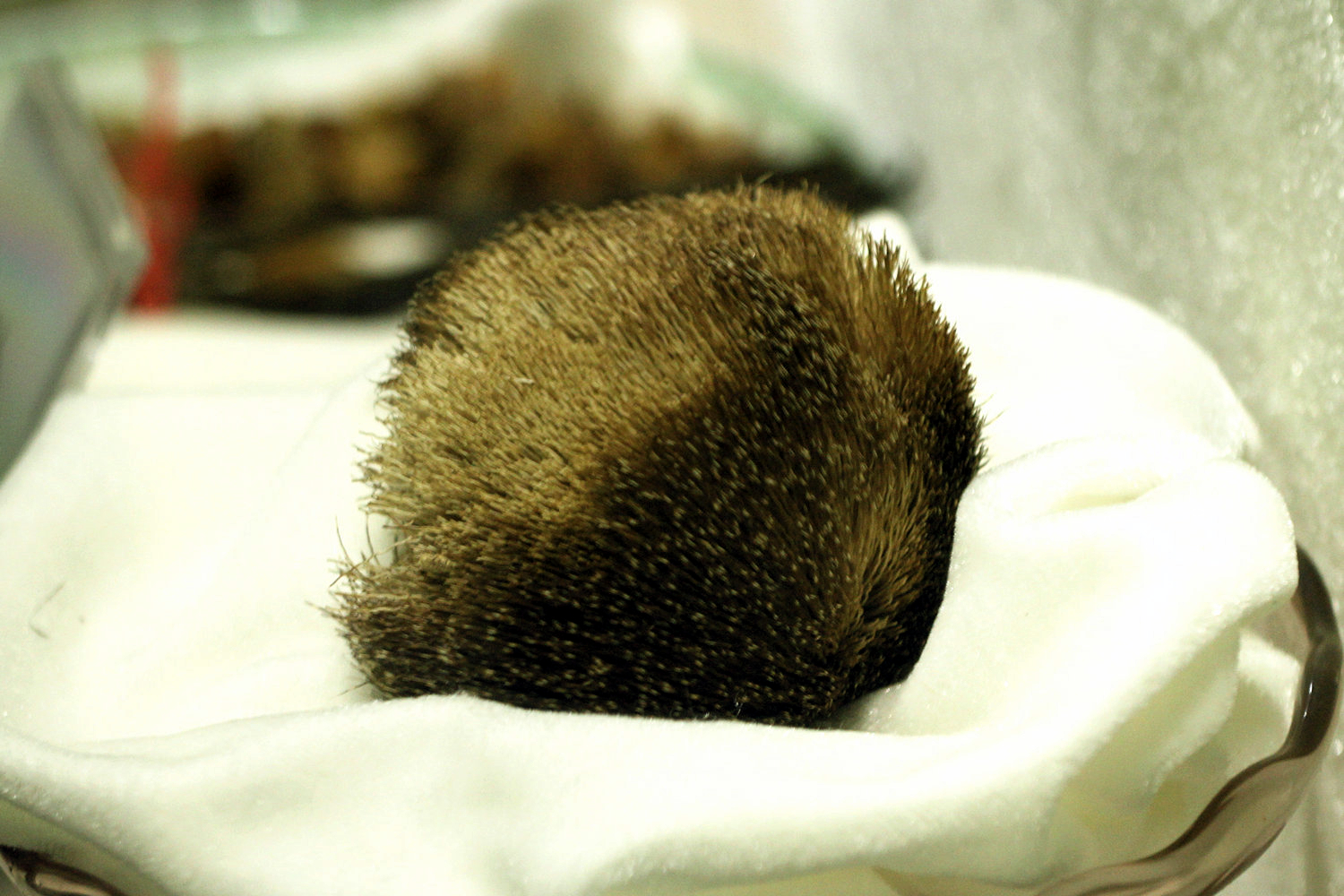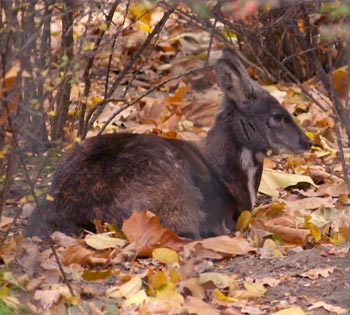Deer Musk on:
[Wikipedia]
[Google]
[Amazon]
 Deer musk is a substance with a persistent odor, obtained from the caudal glands of the male
Deer musk is a substance with a persistent odor, obtained from the caudal glands of the male

Images of musk pods
Animal glandular products Ayurvedic medicaments Perfume ingredients
 Deer musk is a substance with a persistent odor, obtained from the caudal glands of the male
Deer musk is a substance with a persistent odor, obtained from the caudal glands of the male musk deer
Musk deer can refer to any one, or all eight, of the species that make up ''Moschus'', the only extant genus of the family (biology), family Moschidae. Despite being commonly called deer, they are not true deer belonging to the family Cervidae, b ...
.
Although more commonly referred to as " musk", the term itself is often used to describe a wide variety of "musky" substances from other animals such as the African civet
The African civet (''Civettictis civetta'') is a large viverrid native to sub-Saharan Africa, where it is considered common and widely distributed in woodlands and secondary forests. It is listed as Least Concern on the IUCN Red List since 2008 ...
("civet musk") or various synthetic musks whose compound exhibits some character of deer musk.
The demand for deer musk has led to a severe decrease in musk deer
Musk deer can refer to any one, or all eight, of the species that make up ''Moschus'', the only extant genus of the family (biology), family Moschidae. Despite being commonly called deer, they are not true deer belonging to the family Cervidae, b ...
populations; however, musk can be removed from the gland of live male deer without killing the animal and without harming their growth, breeding and health. The extraction of musk from live deer has been successfully conducted many times and the characteristics of musk have been studied at the Kathmandu Zoo in Nepal. Six of the seven musk producing species are listed as Endangered
An endangered species is a species that is very likely to become extinct in the near future, either worldwide or in a particular political jurisdiction. Endangered species may be at risk due to factors such as habitat loss, poaching, inv ...
.
It is also known as kasthuri in rural Indian regions where they are used to make perfumes and face masks.
Cultural history
The etymology of the name ''musk'', originating from IndianSanskrit
Sanskrit (; stem form ; nominal singular , ,) is a classical language belonging to the Indo-Aryan languages, Indo-Aryan branch of the Indo-European languages. It arose in northwest South Asia after its predecessor languages had Trans-cultural ...
''मुष्क'' ''muṣka'' (), spreading it to Middle Persian
Middle Persian, also known by its endonym Pārsīk or Pārsīg ( Inscriptional Pahlavi script: , Manichaean script: , Avestan script: ) in its later form, is a Western Middle Iranian language which became the literary language of the Sasania ...
''مشک mušk'', Late Greek
Late Greek refers to writings in the Greek language in Late Antiquity and the Early Byzantine period; and in other words, from about the late 2nd century AD until about the late 7th century AD.See the definitions of "Late Greek" aDictionary.comanT ...
''μόσχος'' (''moskhos''), Late Latin
Late Latin is the scholarly name for the form of Literary Latin of late antiquity.Roberts (1996), p. 537. English dictionary definitions of Late Latin date this period from the 3rd to 6th centuries CE, and continuing into the 7th century in ...
''muscus'', Middle French
Middle French () is a historical division of the French language that covers the period from the mid-14th to the early 17th centuries. It is a period of transition during which:
* the French language became clearly distinguished from the other co ...
''musc'' and Middle English
Middle English (abbreviated to ME) is a form of the English language that was spoken after the Norman Conquest of 1066, until the late 15th century. The English language underwent distinct variations and developments following the Old English pe ...
''muske'', hints at its trade route.
Musk deer are among the most endangered species
An endangered species is a species that is very likely to become extinct in the near future, either worldwide or in a particular political jurisdiction. Endangered species may be at risk due to factors such as habitat loss, poaching, inv ...
in the region. Scent glands from these deer can fetch thousands of rupees and are used for manufacturing perfume and traditional medicine
Traditional medicine (also known as indigenous medicine or folk medicine) refers to the knowledge, skills, and practices rooted in the cultural beliefs of various societies, especially Indigenous groups, used for maintaining health and treatin ...
.
Deer musk was unknown in the Western world in classical antiquity
Classical antiquity, also known as the classical era, classical period, classical age, or simply antiquity, is the period of cultural History of Europe, European history between the 8th century BC and the 5th century AD comprising the inter ...
and reference to it does not appear until the 5th century AD when it is mentioned in the Talmud
The Talmud (; ) is the central text of Rabbinic Judaism and the primary source of Jewish religious law (''halakha'') and Jewish theology. Until the advent of Haskalah#Effects, modernity, in nearly all Jewish communities, the Talmud was the cen ...
(Brachot 43.) as an animal-based fragrance. The 6th-century Greek explorer Cosmas Indicopleustes mentioned it as a product obtained from India
India, officially the Republic of India, is a country in South Asia. It is the List of countries and dependencies by area, seventh-largest country by area; the List of countries by population (United Nations), most populous country since ...
. Soon afterwards Arab and Byzantine
The Byzantine Empire, also known as the Eastern Roman Empire, was the continuation of the Roman Empire centred on Constantinople during late antiquity and the Middle Ages. Having survived the events that caused the fall of the Western Roman E ...
perfume makers began to use it, and it acquired a reputation as an aphrodisiac
An aphrodisiac is a substance that increases libido, sexual desire, sexual attraction, sexual pleasure, or sexual behavior. These substances range from a variety of plants, spices, and foods to synthetic chemicals. Natural aphrodisiacs, such as ...
. Under the Abbasid Caliphate
The Abbasid Caliphate or Abbasid Empire (; ) was the third caliphate to succeed the Islamic prophet Muhammad. It was founded by a dynasty descended from Muhammad's uncle, Abbas ibn Abd al-Muttalib (566–653 CE), from whom the dynasty takes ...
, it was highly regarded, and the caliph
A caliphate ( ) is an institution or public office under the leadership of an Islamic steward with Khalifa, the title of caliph (; , ), a person considered a political–religious successor to the Islamic prophet Muhammad and a leader of ...
s of Baghdad
Baghdad ( or ; , ) is the capital and List of largest cities of Iraq, largest city of Iraq, located along the Tigris in the central part of the country. With a population exceeding 7 million, it ranks among the List of largest cities in the A ...
used it lavishly. In the early 9th century, Al-Kindi included it in a large number of his perfume recipes and it became one of the important luxury items brought by Arabian ships from the East.
Deer musk has been a key constituent in many perfumes since its discovery, being held to give a perfume long-lasting power as a fixative. Despite its high price, musk tinctures were used in perfumery until 1979, when musk deer were protected as an endangered species by the Convention on the International Trade in Endangered Species of Wild Flora and Fauna
CITES (shorter acronym for the Convention on International Trade in Endangered Species of Wild Fauna and Flora, also known as the Washington Convention) is a multilateral treaty to protect endangered plants and animals from the threats of inte ...
(CITES). Today, the trade quantity of the natural musk is controlled by CITES but illegal poaching
Poaching is the illegal hunting or capturing of wild animals, usually associated with land use rights.
Poaching was once performed by impoverished peasants for subsistence purposes and to supplement meager diets. It was set against the huntin ...
and trading continues.
Harvesting

Musk deer
Musk deer can refer to any one, or all eight, of the species that make up ''Moschus'', the only extant genus of the family (biology), family Moschidae. Despite being commonly called deer, they are not true deer belonging to the family Cervidae, b ...
belong to the family Moschidae. White-bellied musk deer occurs in the Himalayas. To obtain deer musk, the deer is killed and its gland, also called "musk pod", is removed.
Harvesting of musk pods is the main threat to '' Moschus'' species.
In China, musk pods from the dwarf musk deer, the alpine musk deer, and the Siberian musk deer
The Siberian musk deer (''Moschus moschiferus'') is a musk deer found in the mountain forests of Northeast Asia. It is most common in the taiga of southern Siberia, but is also found in parts of Mongolia, Inner Mongolia, Manchuria and the Korean ...
are currently accepted per the Pharmacopoeia of the People's Republic of China, although official sources claim that more than 99% of the said use has been replaced by an artificial replacement of an undisclosed composition.
Properties
Deer musk is of a dark purplish color, dry, smooth and unctuous to the touch, and bitter in taste. According to Encyclopædia Britannica, "a grain of musk will distinctly scent millions of cubic feet of air without any appreciable loss of weight, and its scent is not only more penetrating but also more persistent than that of any other known substance". In addition to its odoriferous principle, it containsammonia
Ammonia is an inorganic chemical compound of nitrogen and hydrogen with the chemical formula, formula . A Binary compounds of hydrogen, stable binary hydride and the simplest pnictogen hydride, ammonia is a colourless gas with a distinctive pu ...
, cholesterol
Cholesterol is the principal sterol of all higher animals, distributed in body Tissue (biology), tissues, especially the brain and spinal cord, and in Animal fat, animal fats and oils.
Cholesterol is biosynthesis, biosynthesized by all anima ...
, fatty matter, a bitter resin
A resin is a solid or highly viscous liquid that can be converted into a polymer. Resins may be biological or synthetic in origin, but are typically harvested from plants. Resins are mixtures of organic compounds, predominantly terpenes. Commo ...
ous substance, and other animal principles.
The highest quality is Tonkin musk from Vietnam
Vietnam, officially the Socialist Republic of Vietnam (SRV), is a country at the eastern edge of mainland Southeast Asia, with an area of about and a population of over 100 million, making it the world's List of countries and depende ...
, followed by Assam
Assam (, , ) is a state in Northeast India, northeastern India, south of the eastern Himalayas along the Brahmaputra Valley, Brahmaputra and Barak River valleys. Assam covers an area of . It is the second largest state in Northeast India, nor ...
and Nepal
Nepal, officially the Federal Democratic Republic of Nepal, is a landlocked country in South Asia. It is mainly situated in the Himalayas, but also includes parts of the Indo-Gangetic Plain. It borders the Tibet Autonomous Region of China Ch ...
musk, while Carbadine musk from Russian and Chinese Himalayan regions are considered inferior.
See also
* Preputial glands *Perfume
Perfume (, ) is a mixture of fragrance, fragrant essential oils or aroma compounds (fragrances), Fixative (perfumery), fixatives and solvents, usually in liquid form, used to give the human body, animals, food, objects, and living-spaces an agre ...
* Musk
Further reading
*References
{{reflistExternal links
Images of musk pods
Animal glandular products Ayurvedic medicaments Perfume ingredients